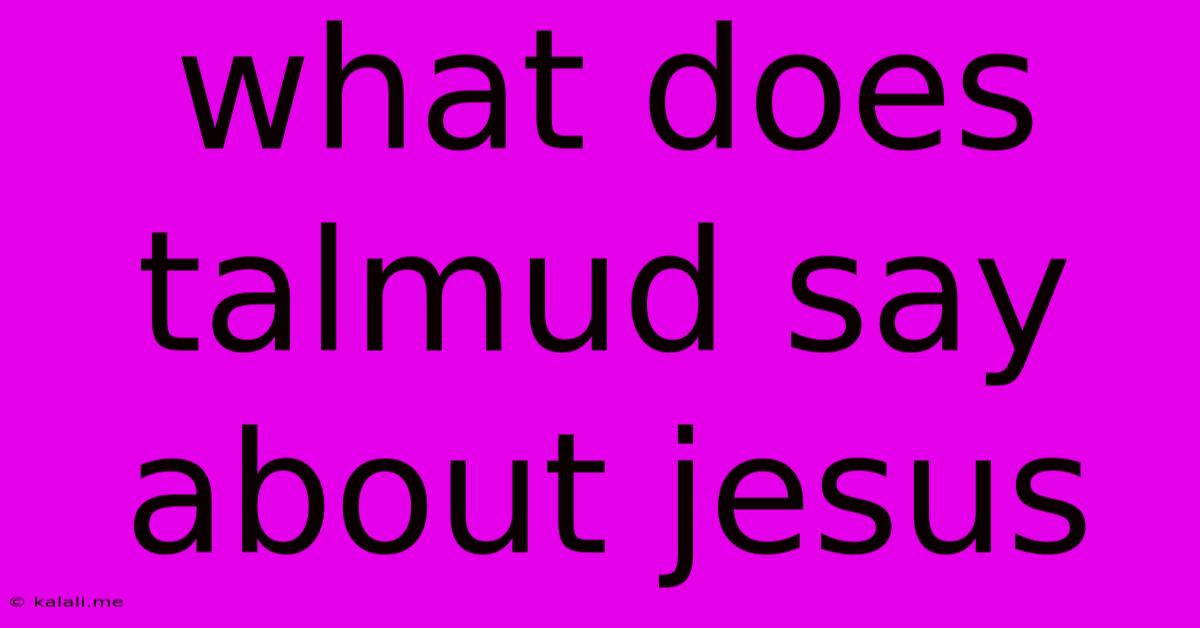What Does Talmud Say About Jesus
Kalali
Jun 07, 2025 · 3 min read

Table of Contents
What Does the Talmud Say About Jesus? A Complex and Contentious Topic
The question of what the Talmud says about Jesus is a complex one, fraught with historical, theological, and scholarly debate. Understanding the Talmud's perspective requires careful consideration of its context, its various interpretations, and the limitations of historical sources. This article aims to provide a balanced overview, acknowledging the complexities and avoiding simplistic conclusions. This is a sensitive topic and interpretations vary widely among scholars.
The Talmud, a vast collection of rabbinic writings comprising the Mishnah and Gemara, doesn't contain a single, unified account of Jesus. References to Yeshu (ישו), the Hebrew name for Jesus, appear in a few passages within the Babylonian Talmud and, to a lesser extent, the Jerusalem Talmud. These passages are brief, often embedded within larger discussions, and their interpretation is far from settled.
The Limited References in the Talmud
The references are primarily found in b. Sanhedrin 43a and related passages. These sections primarily focus on Yeshu and his supposed acts of sorcery and idolatry, leading to his execution. It's crucial to note that these accounts are presented within the framework of rabbinic legal discussions and not as historical biographies. They are embedded within discussions about capital punishment and the laws surrounding false prophecy.
-
The Charges Against Yeshu: The Talmudic accounts depict Yeshu as a practitioner of sorcery, leading astray the Jewish people. These accusations are not presented as historical evidence but as points of legal discussion surrounding the application of Jewish law to individuals deemed to have violated religious precepts. The details of these accusations vary across interpretations and often involve speculation and embellishment.
-
Lack of Context and Historical Accuracy: The Talmudic accounts lack the detailed historical context found in other ancient sources. The brevity and lack of corroborating evidence make it difficult to assess their historical accuracy. It’s important to note that the Talmud's primary aim wasn't historical record-keeping, but rather to interpret and apply Jewish law.
-
Variations in Interpretation: Even among Talmudic scholars, there's no consensus on the interpretation of these passages. Some scholars argue that the Talmudic accounts are accurate reflections of contemporary Jewish views of Jesus, while others view them as later additions or interpretations influenced by theological biases. The varying interpretations often reflect the perspectives and agendas of different scholarly schools and time periods.
The Significance of Context and Historical Limitations
It's essential to approach these passages with a critical eye, acknowledging the limitations of the sources. The Talmud was compiled centuries after Jesus's life, and the accounts are likely influenced by the evolving relationship between Judaism and nascent Christianity. Understanding the historical context is crucial to interpreting these brief and often cryptic mentions.
The absence of extensive detailed accounts in the Talmud doesn't necessarily indicate a lack of awareness of Jesus among rabbis. The sparse mentions might reflect a deliberate choice to avoid extensive discussion of a figure perceived as a marginal threat to the Jewish religious tradition.
Conclusion: A Matter of Ongoing Scholarly Debate
The Talmud's references to Jesus are few, brief, and embedded within legal discussions. Their interpretation remains a subject of ongoing scholarly debate, with significant variations among scholars. It's crucial to approach these passages with critical awareness of their historical context and the limitations of the source material. Avoiding simplistic conclusions and acknowledging the range of interpretations is essential for a nuanced understanding of this complex and contentious topic. The Talmud provides only a limited and highly contested glimpse into the Jewish perspective on Jesus in the centuries following his death. A comprehensive understanding necessitates considering other historical and archaeological sources alongside the Talmudic texts.
Latest Posts
Latest Posts
-
How To Say At In Chinese
Jun 08, 2025
-
What Can I Substitute Vegetable Oil For In Brownies
Jun 08, 2025
-
Can You Run Extension Cord Through Wall
Jun 08, 2025
-
How To Loosen Oil Drain Plug
Jun 08, 2025
-
Assigning A List To Another List C
Jun 08, 2025
Related Post
Thank you for visiting our website which covers about What Does Talmud Say About Jesus . We hope the information provided has been useful to you. Feel free to contact us if you have any questions or need further assistance. See you next time and don't miss to bookmark.